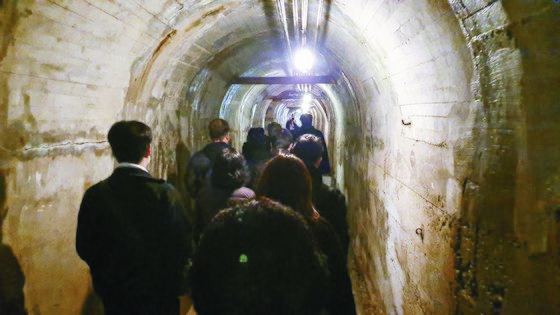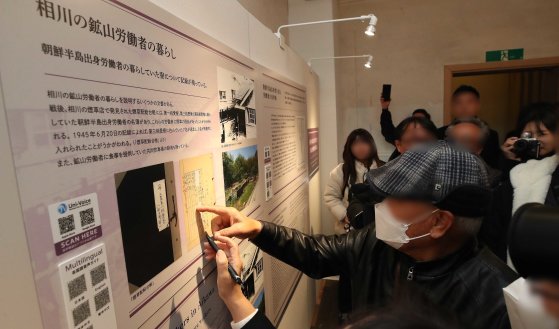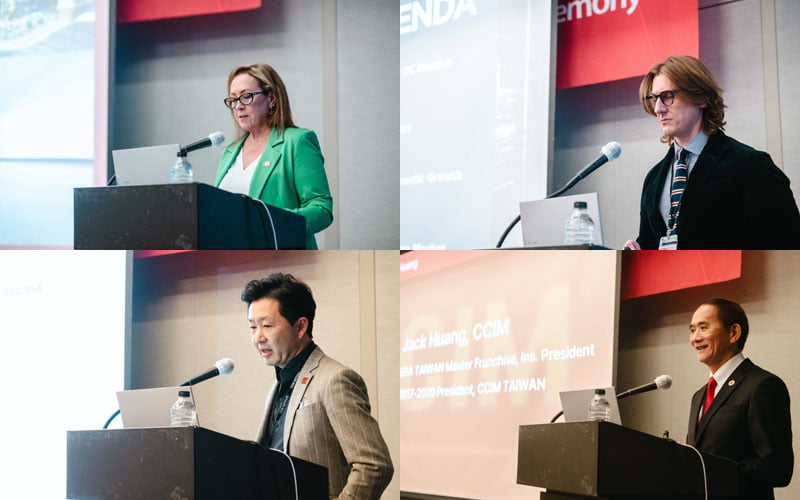“Our parents were taken away and suffered during the 36 years that Japan harassed us (during the Japanese colonial period). I really wanted to point this out in front of them…”
Kim Gwang-seon (82), a bereaved family member who visited the Sado Mine in Niigata Prefecture, Japan, where his father was forcibly taken and suffered harsh labor during the Japanese colonial period, said in a phone call with the JoongAng Ilbo on the 27th, “I ended up returning from Sado without being able to say what I wanted to say.” Sado Island was Kim’s birthplace, but it can never be his hometown. Mr. Kim’s father had his lungs damaged by mine stone dust while working in harsh conditions, and his family also suffered throughout their lives.
Nine bereaved family members of the Korean victims of the Sado Mine, including Mr. Kim, headed to Sado Island on the 23rd in anticipation of a sincere memorial service in Japan. It is said that his daughter, who is in her 50s, also joined Mr. Kim for four days in search of traces of her grandfather.
However, as Japan did not keep the spirit of the agreement reached when listing the Sado Mine as a UNESCO World Heritage Site last July, the memorial ceremony was held separately between Korea and Japan, with each holding a ‘half’ ceremony. The bereaved family did not hear the acknowledgment or apology from Japan that they had hoped for. During the phone call, Mr. Kim repeated several times, “This time, Japan was really at fault.” The following is a Q&A.
Korean bereaved families and attendees stand in silence after laying flowers at the memorial ceremony for Korean victims of forced mobilization at Sado Mine held at the site of the Korean dormitory at Sado Mine in Niigata Prefecture, Japan on the 25th. Yonhap News
The bereaved families were told why the memorial service was canceled. They heard that there was no coordination between Korea and Japan at the last minute. It is said that Japan tried to hold the memorial ceremony as if it were a ‘cultural event.’ So we also say, ‘That shouldn’t be done. They said, ‘We can’t participate, so we’ll do it our way.’ I understand that since we came this far, we gathered together and held a memorial service.
Previously, on the 23rd, Korea suddenly announced its absence from the ‘Sado Mine Memorial Ceremony’ hosted by Japan, one day before. On this day, Japan notified that it would send Akiko Ikuina (Vice Minister level), Political Affairs Officer of the Ministry of Foreign Affairs, who was reported to have visited Yasukuni Shrine, where Class A war criminals from World War II are enshrined, as a government representative. In addition, the eulogy shared at the last minute with Korea did not contain any acknowledgment of the mobilization and forced labor of Koreans or any expression of apology.
Japan eventually removed the ‘eulogy’ from the memorial ceremony order that Korea did not, and replaced it with ‘greetings’. This is why Mr. Kim expressed that he tried to hold the memorial service in Japan like a ‘cultural event’ rather than a memorial service.
No matter what his original intention was to head to Sado Island, he was born there while his father was making money by drilling stones at the Sado Mine. I wanted to go back and point out Japan’s mistakes. Japan tormented us for 36 years, and our parents suffered there. But in the end, there was no proper reflection and I wondered what this was. How was the memorial service hosted by Korea (Park Cheol-hee, Korea in Japan)? After reading the eulogy written by the ambassador, each person prayed, bowed, and drank alcohol. I prayed so that the mountains would resound. Since this is our first memorial service, how can we all be satisfied? However, I think next year (the memorial service) should be held according to a better agreement (between Korea and Japan).![[단독] Sado Mine bereaved family: “Japan caused 36 years of suffering… This time, they were really wrong.” [단독] Sado Mine bereaved family: “Japan caused 36 years of suffering… This time, they were really wrong.”](https://pds.joongang.co.kr/news/component/htmlphoto_mmdata/202411/28/8984d21f-95dd-42e9-92bf-ed9afa00dc41.jpg)
On the morning of the 25th, the bereaved family lays a flower at the memorial ceremony for the Korean victims of forced mobilization at Sado Mine held at the 4th Sado Mine Korean dormitory site in Sado City, Niigata Prefecture, Japan. News 1
The official ceremony of the ‘Memorial Ceremony for the Korean Victims Forced to Sado Mine’ held on this day ended in 10 minutes. After the memorial service, the bereaved family toured the mine shaft that had been turned into a tourist attraction. There are about 400 km of tunnels, and Japan has two of them open to the public.
Mr. Kim’s father is the late Kim Jong-won, born in 1912. After hearing that he could make a lot of money, he was conscripted to work at the Sado Mine in Nonsan, South Chungcheong Province, in 1940.
It reminded me a lot of what it was like to see the tunnel where my father worked. There were many tunnels that were closed to prevent people from entering, and there were also places that had fallen apart like beehives. To be honest, I thought to myself, ‘They say it’s registered in UNESCO, but will people really come to see it?’ My father’s lungs were damaged while working here, and I, as a child, sacrificed myself by not being able to study as much as I wanted to because I had to take care of my younger siblings. Several thoughts came to mind.
Relatives of Korean victims of forced mobilization at Sado Mine are looking around the mine shaft after a memorial ceremony held at the site of the Korean dormitory at Sado Mine in Niigata Prefecture, Japan on the 25th. Yonhap News
Meanwhile, the previous day, the bereaved families also visited the Aikawa Museum of Local History next to Sado Mine, which has an exhibition space related to Korean workers. Last July, just before listing Sado Mine as a World Cultural Heritage site, Japan followed the recommendation of the International Council on Monuments and Sites (ICOMOS) and the decision of the World Heritage Committee to “reflect the ‘whole history’ of Sado Mine ‘in the field’ of Sado Mine.” An exhibition hall was opened, but controversy arose because none of the exhibits acknowledging forced labor were included.
There were not many things on display and it was so small that it was difficult to call it a museum. I searched carefully to see if my father’s name was still there, but it wasn’t there. I felt like it was made without any sincerity.
On the 24th, in a small exhibition room at the Aikawa Local Museum near the Sado Mine in Sado City, Niigata Prefecture, Japan, family members of victims of forced conscription at the Sado Mine are looking at a panel explaining Korean workers. News 1
How do you think the Korean government responded to this memorial service disruption? Honestly, I think the government did its best. The bereaved families were treated with sincerity throughout the schedule. It is unfortunate that there was no agreement between Korea and Japan, but if the government had not taken them and the bereaved families had tried to go on their own, it would have cost millions of won. I am grateful that I was able to go to places I couldn’t go even if I wanted to.
Meanwhile, the Japanese government invited Korean bereaved families to this memorial ceremony but did not bear any related costs. It was also pointed out that the fact that the Korean government covered the entire cost did not conform to custom.
Reporter Park Hyun-ju [email protected]

